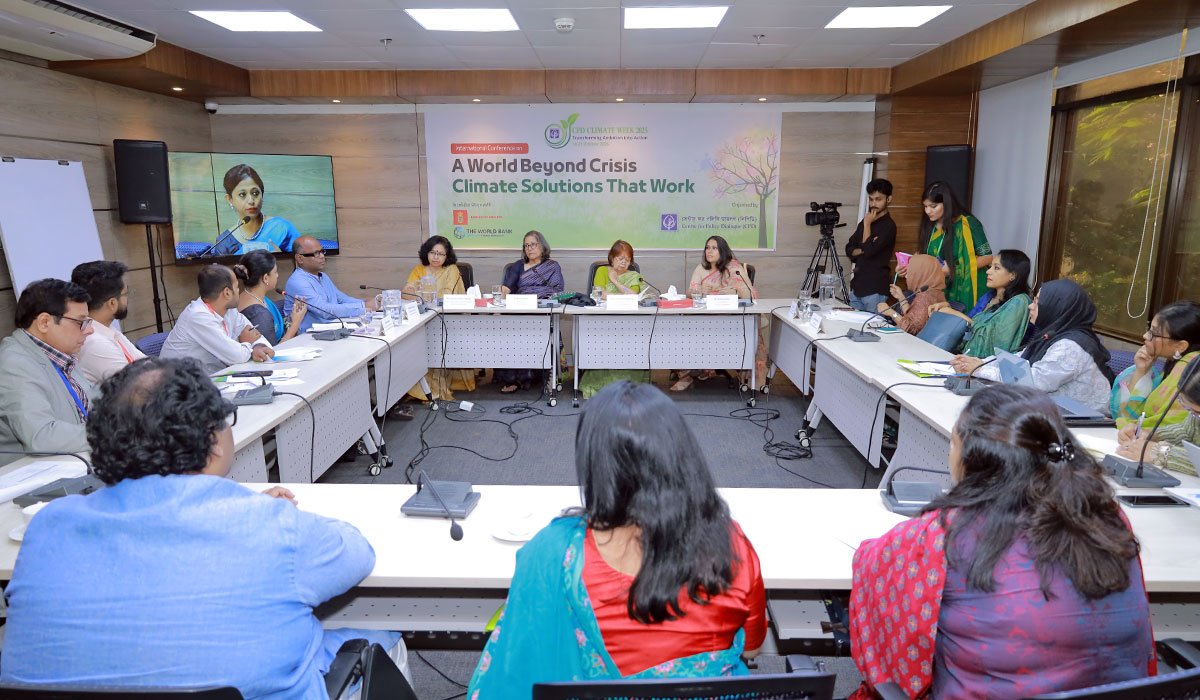
Building true climate resilience requires more than infrastructure and finance — it demands justice, inclusion, and shared leadership. “Gender Equality is a Climate Solution” emerged as the defining message of the Parallel Session 2 “Climate and Gender: Integrating Equity in Policies”, held as part of CPD Climate Week 2025.
Experts from academia, government, media, and civil society underscored that women’s participation must go beyond token inclusion to genuine leadership in adaptation planning, climate finance, and technology access — transforming gender equality from a secondary concern into a core strategy for effective climate action.

Professor Rounaq Jahan, Distinguished Fellow at CPD, questioned whether gender mainstreaming has gone beyond rhetoric. “We’ve talked about integration for decades — but how much of it is real, and how much remains symbolic?” she asked, calling for women’s ownership in land, finance, and disaster management to be central to climate justice.
“Bangladesh’s policy frameworks are strong but gender sensitivity remains limited,” noted Ms Banasree Mitra Neogi, Executive Director of Manusher Jonno Foundation. She urged the government to strengthen capacity-building for ccGAP implementation and to scale up community-based, women-led programmes.
Ms Farah Kabir, Country Director of ActionAid Bangladesh, lamented that women and youth remain sidelined in climate discourse. “The agenda remains elusive — we cannot build resilience without women and youth at the centre,” she said, pressing for stronger inter-ministerial coordination, local-led adaptation, and gender-focused climate financing.
“Different groups of women experience climate risks differently,” observed Dr Faria Sultana of the American International University–Bangladesh (AIUB). She called for more disaggregated data, stronger evaluation mechanisms, and the inclusion of women’s perspectives in policy design and climate financing.

From the media, Mr Sheikh Rokon of Daily Samakal illustrated how women suffer most from river erosion and displacement, often preferring smaller, nature-based solutions over costly infrastructure. He urged greater use of indigenous knowledge and local women’s input in project planning.
Sharing Nepal’s experience, Ms Shakti Gurung of DPNet said her country is shifting “from gender-aware to gender-transformative” policies. She credited civil society–government partnerships for progress in women’s participation and accountability in disaster response.
Dr Farhana Rafiq of AIUB discussed how access to technology — from solar power to mobile finance — enhances women’s decision-making and social participation, but stressed that “ownership, not just access, ensures empowerment.”
Ms Nuzhat Jabin of Christian Aid Bangladesh warned that gender often becomes “a tick box exercise,” and called for moving from microcredit to inclusive financial tools like insurance schemes that reduce women’s vulnerability.
From the UN perspective, Ms Sharmin Islam of UNDP emphasised that “gender equality itself is a climate solution.” She highlighted the need for local government capacity, private-sector engagement, and working with men to change social norms around gender and climate roles.
The open discussion spotlighted mental health, early marriage, and displacement as overlooked aspects of gendered climate impacts. Participants called for participatory advocacy, accessible data, and coordinated action among ministries, NGOs, and local communities.
In closing, Professor Jahan reaffirmed that true transformation demands “leadership, ownership, and equal opportunity for women,” adding that lasting change requires both women’s agency and male support.
🌎 Check out all session web posts and videos of the international conference “A World Beyond Crisis: Climate Solutions That Work.”
- Inaugural Session | A World Beyond Crisis: Climate Solutions That Work
Web post | Video - Opening Plenary | Road to COP30: How Can National Interests Be Aligned with Global Climate Goals?
Web post | Video - Parallel Session 1 | Operationalising NDCs in Climate Vulnerable Countries
Web post | Video - Parallel Session 2 | Climate and Gender: Integrating Equity in Policies
Web post | Video - Parallel Session 3 | Carbon Pricing and Carbon Markets in Bangladesh
Web post | Video - Parallel Session 4 | Climate-smart Agriculture and Food Security
Web post | Video - Parallel Session 5 | Climate Finance, Landscape, Policy and Governance
Web post | Video - Parallel Session 6 | High Level Dialogue on Achieving Debt Sustainability in the Face of Climate Change
Web post | Video


